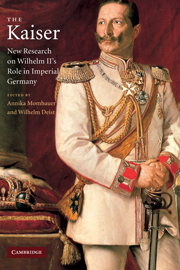Book contents
- Frontmatter
- Contents
- Notes on contributors
- Acknowledgements
- List of abbreviations
- Introduction
- Reflections on John Röhl: a Laudatio
- 1 Wilhelm II and ‘his’ navy, 1888–1918
- 2 Hollow-sounding jubilees: forms and effects of public self-display in Wilhelmine Germany
- 3 The Kaiser's elite? Wilhelm II and the Berlin administration, 1890–1914
- 4 Wilhelm, Waldersee, and the Boxer Rebellion
- 5 Dreams of a German Europe: Wilhelm II and the Treaty of Björkö of 1905
- 6 The uses of ‘friendship’. The ‘personal regime’ of Wilhelm II and Theodore Roosevelt, 1901–1909
- 7 Military diplomacy in a military monarchy? Wilhelm II's relations with the British service attachés in Berlin, 1903–1914
- 8 Wilhelm II as supreme warlord in the First World War
- 9 Germany's ‘last card’. Wilhelm II and the decision in favour of unrestricted submarine warfare in January 1917
- 10 Military culture, Wilhelm II, and the end of the monarchy in the First World War
- 11 Rathenau, Wilhelm II, and the perception of Wilhelminismus
- 12 Structure and agency in Wilhelmine Germany: the history of the German Empire – past, present, and future
- Index
10 - Military culture, Wilhelm II, and the end of the monarchy in the First World War
Published online by Cambridge University Press: 24 July 2009
- Frontmatter
- Contents
- Notes on contributors
- Acknowledgements
- List of abbreviations
- Introduction
- Reflections on John Röhl: a Laudatio
- 1 Wilhelm II and ‘his’ navy, 1888–1918
- 2 Hollow-sounding jubilees: forms and effects of public self-display in Wilhelmine Germany
- 3 The Kaiser's elite? Wilhelm II and the Berlin administration, 1890–1914
- 4 Wilhelm, Waldersee, and the Boxer Rebellion
- 5 Dreams of a German Europe: Wilhelm II and the Treaty of Björkö of 1905
- 6 The uses of ‘friendship’. The ‘personal regime’ of Wilhelm II and Theodore Roosevelt, 1901–1909
- 7 Military diplomacy in a military monarchy? Wilhelm II's relations with the British service attachés in Berlin, 1903–1914
- 8 Wilhelm II as supreme warlord in the First World War
- 9 Germany's ‘last card’. Wilhelm II and the decision in favour of unrestricted submarine warfare in January 1917
- 10 Military culture, Wilhelm II, and the end of the monarchy in the First World War
- 11 Rathenau, Wilhelm II, and the perception of Wilhelminismus
- 12 Structure and agency in Wilhelmine Germany: the history of the German Empire – past, present, and future
- Index
Summary
The German monarchy ended on 9 November 1918 with a whimper, not a bang. As the royal train slipped over the Dutch border, the public and the new revolutionary government turned their attention to the more pressing matter of survival. At Third Army headquarters and doubtless elsewhere, high-ranking officers discussed counterrevolution, but nothing came of it. Wilhelm II's silent departure to Holland was preceded by years of declining authority. This chapter investigates how that decline actually occurred during the First World War, and examines the unconscious role that monarchists themselves played in undermining both the monarch and the monarchy.
Historians see the decline of monarchical authority in three stages: the rise and fall of ‘personal regime’, the failure of Weltpolitik, and the eclipse of Wilhelm's governing power during the war. The historian this Festschrift honours, John Röhl, has contributed most to illuminating the first problematic, the question of personal regime. The picture that has emerged, and is still emerging in Röhl's monumental multi-volumed biography of the Kaiser, shows an activist but uneven and sporadic monarch, who sought to wield power personally, but in a modern-seeming way. Wilhelm II took advantage of the tremendous power invested in the monarch (especially in foreign policy and military command power) by Chancellor Otto von Bismarck's peculiar constitution, on the one hand, and by the popular hunger for a national representative and embodiment of the modern Germany, on the other. Wilhelm successfully made himself an icon of German industrial and military might.
- Type
- Chapter
- Information
- The KaiserNew Research on Wilhelm II's Role in Imperial Germany, pp. 235 - 258Publisher: Cambridge University PressPrint publication year: 2003
- 3
- Cited by

